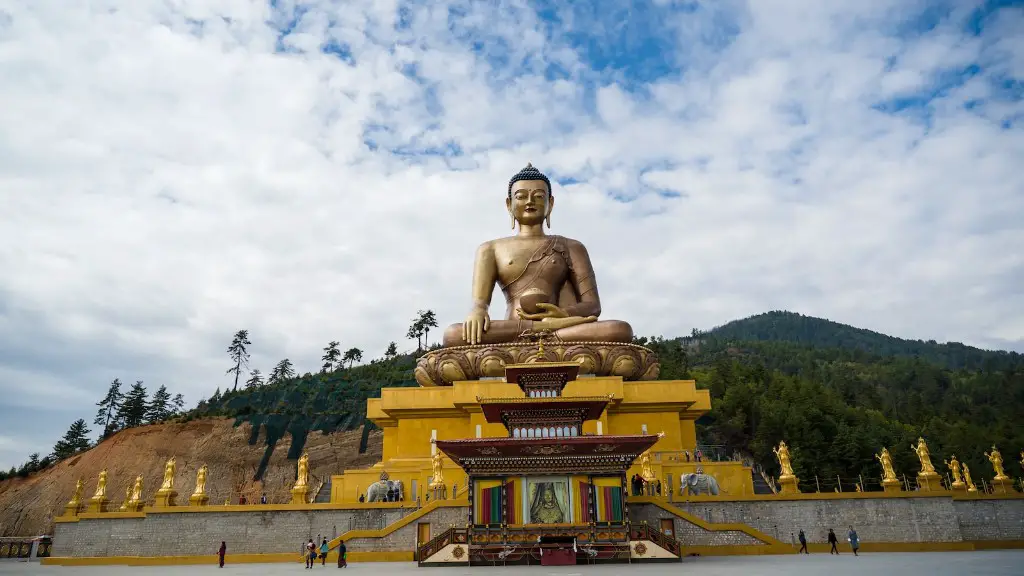Buddhism is one of the world’s oldest religions, founded by Siddhartha Gautama over 2,500 years ago in India. Siddhartha Gautama, who would become the Buddha, was born into a wealthy family but later became a mendicant, or wandering ascetic. After six years of asceticism, during which he tried unsuccessfully to find enlightenment through various practices, the Buddha is said to have attained nirvana, or perfect peace of mind, under a tree. The Buddha then spent the rest of his life traveling and teaching his followers, or Sangha, the path to enlightenment.
Buddhism is based on the Four Noble Truths, which state that life is suffering, that suffering is caused by craving and attachment, that suffering can be ended by eliminating craving and attachment, and that this can be accomplished by following the Eightfold Path. The Eightfold Path includes right understanding, right resolve, right speech, right action, right livelihood, right effort, right mindfulness, and right meditation.
In a nutshell, Buddhism is the teaching of the Buddha, which is based on the Four Noble Truths. The truth of suffering, the truth of the origin of suffering, the truth of the cessation of suffering, and the truth of the path to the cessation of suffering. The main goal of Buddhism is to end suffering for all beings.
How do you explain Buddhism to kids?
A Buddhist is someone who follows the teachings of the Buddha. The Buddha was a man who lived in India and realized that there was suffering in the world. He wanted to understand why there was suffering and developed a set of teachings to help people end their suffering. Buddhists follow these teachings in order to end their own suffering and to help others end their suffering as well.
Buddhism is a religion that is based on the teachings of Siddhartha Gautama. The main principles of this belief system are karma, rebirth, and impermanence. Buddhism teaches that karma is the result of our actions and that our destiny is determined by our karma. rebirth is the belief that after we die, we are reborn into another life. impermanence is the belief that nothing in life is permanent and that everything is subject to change.
What is the main belief of Buddhism
Buddhism teaches that after we die, our consciousness is reborn into another body. This process is called reincarnation. Although most people go through many cycles of birth, living, death and rebirth, a practicing Buddhist strives to break this cycle.
Buddhism is a tradition focused on spiritual liberation, not theistic religion. The Buddha himself rejected the idea of a creator god, and Buddhist philosophers have even argued that belief in an eternal god is nothing but a distraction for humans seeking enlightenment.
What are 3 important facts about Buddhism?
Buddhism is the fourth largest religion in the world, with 360 million followers. In Buddhism, there is no single holy book. Extensive scriptures have been preserved in many Asian languages. Buddhists don’t believe in a supreme being or creator god.
Buddhism is a religion that began in India about 2,500 years ago. It is based on the teachings of Siddhartha Gautama, who is known as the Buddha. Buddhists do not believe in a god who created everything. They believe that people can create their own happiness.
What is Buddhism vs Christianity?
Buddhism and Christianity are two very different religions. Christianity is a monotheistic religion that believes in one God who created the world and sets forth divine values for it. Buddhism, on the other hand, is a non-theistic religion that does not believe in a creator God. Rather, Buddhists believe that each individual is responsible for their own actions and for creating their own values.
Buddhism teaches that drinking or using other kinds of drugs can cause carelessness and should be avoided. It is believed that strong Buddhist beliefs would have a significant impact on alcohol use.
What do Buddhists believe happens after death
According to Buddhist teaching, life and death are part of a continuum. consciousness (the spirit) continues after death and may be reborn. Death can be an opportunity for liberation from the cycle of life, death and rebirth.
The Three Buddhist Deities Vajrapāṇi, Mañjuśrī and Avalokiteśvara are important figures in Buddhism. Vajrapāṇi is a protector of the Buddha and a powerful warrior. Mañjuśrī is the Buddha of Wisdom and is often depicted holding a sword. Avalokiteśvara is the Buddha of Compassion and is often shown with a thousand arms to signify his ability to help all beings.
How do Buddhists worship?
Buddhists worship at temples or monasteries, where they meditate and pray. Some also set up shrines at home to worship privately. Buddhists offer fresh flowers, lights, and lamps, or burn fragrant incense at shrines with images of the Buddha. These acts pay respect to the Buddha and make merit for the devotee.
The precepts are a set of commitments that Buddhists take on in order to develop their mind and character and progress on the path to enlightenment. The precepts include commitments to abstain from killing living beings, stealing, sexual misconduct, lying and intoxication.
Do Buddhists believe in heaven
In Buddhism, there is no concept of punishment or reward and there is no divine being who decides who goes to hell or heaven. There is merely the illusory results of our thought, words and deeds, which we call karma.
There is no one specific path to enlightenment, but Siddhartha Gautama’s story is a popular and well-known example of someone who attained it. Gautama was born into a royal family but chose to leave his comfortable life to live as a ascetic. After years of study and meditation, he finally reached enlightenment and became known as the Buddha.
Enlightenment is a state of complete understanding and awareness. Buddhists believe that it is possible for anyone to reach this state, but it takes dedication and hard work. There are many different paths that one can take to reach enlightenment, and there is no single right or wrong way to do it.
Do Buddhists celebrate Christmas?
Despite what many people think, Buddhists do participate in the holiday season. In fact, three-quarters of Asian American Buddhists celebrate Christmas. On December 8, some Buddhists also observe Bodhi Day, which marks the anniversary of when the Buddha reached enlightenment.
The Eight Factors of the Noble Eightfold Path are: Right View (or Right Understanding), Right Intention (or Right Thought), Right Speech, Right Action, Right Livelihood, Right Effort, Right Mindfulness, and Right Concentration.
Right View is the proper understanding of the Four Noble Truths. Right Intention is the commitment to renounce attachment, aversion, and ignorance. Right Speech is abstaining from lying, gossiping, slandering, and harsh speech. Right Action is abstaining from taking life, stealing, and sexual misconduct. Right Livelihood is avoiding a livelihood that causes suffering. Right Effort is making a commitment to overcome unwholesome states of mind and to develop wholesome states of mind. Right Mindfulness is the development of clear and single-minded awareness of the body, feelings, mind, and mental objects. Right Concentration is the development of meditative practices that lead to the stilling of the mind and one-pointedness of concentration.
The Eight Factors of the Noble Eightfold Path are interdependent and each factor upholds and strengthens the others. When developed together, they lead to the end of suffering.
Why do Buddhists shave their heads
Buddhist monks and nuns shave their heads to symbolize their renunciation of worldly attachments and their dedication to the religious life. Shaving the head is one of the key indicators of renunciation showing that a person has given up ordinary life and will live outside of social conventions.
Buddhism is a religion and philosophy that teaches compassion, tolerance, andnon-violence. The main form of mental training is meditation. Meditation allowsus to focus and connect with our inner thoughts and feelings. By practicingmeditation regularly, we can learn to control and focus our thoughts, which can leadto inner peace.
In addition to meditation, Buddhist teachings promote making connections with others. Basic Buddhist teachings are about practicing kindness, humor, and compassion towards other people. These teachings can help us to form strong and supportive relationships, which can in turn benefit our mental health.
Finally, Buddhist beliefs about karma can help us to feel in control of our lives. Karma is often misunderstood as a form of fate or destiny. However, karma actually refers to the actions and choices we make. Therefore, by making positive choices and actions, we can create good karma and improve our mental health.
Final Words
Buddhism is a path of spiritual development that includes ethical and meditation practices. The goal of Buddhism is to reach a state of nirvana, or perfect peace.
Buddhism is a religion based on the teachings of Siddhartha Gautama, who was born in Nepal in the 6th century BC. Siddhartha Gautama was a spiritual teacher who developed the core beliefs of Buddhism. The main tenets of Buddhism are the Four Noble Truths, which teach that suffering is an inherent part of life, and that the cause of suffering is desire. The goal of Buddhism is to achieve liberation from suffering by following the Eightfold Path, which is a system of ethical and moral principles that guide a person to enlightenment.



